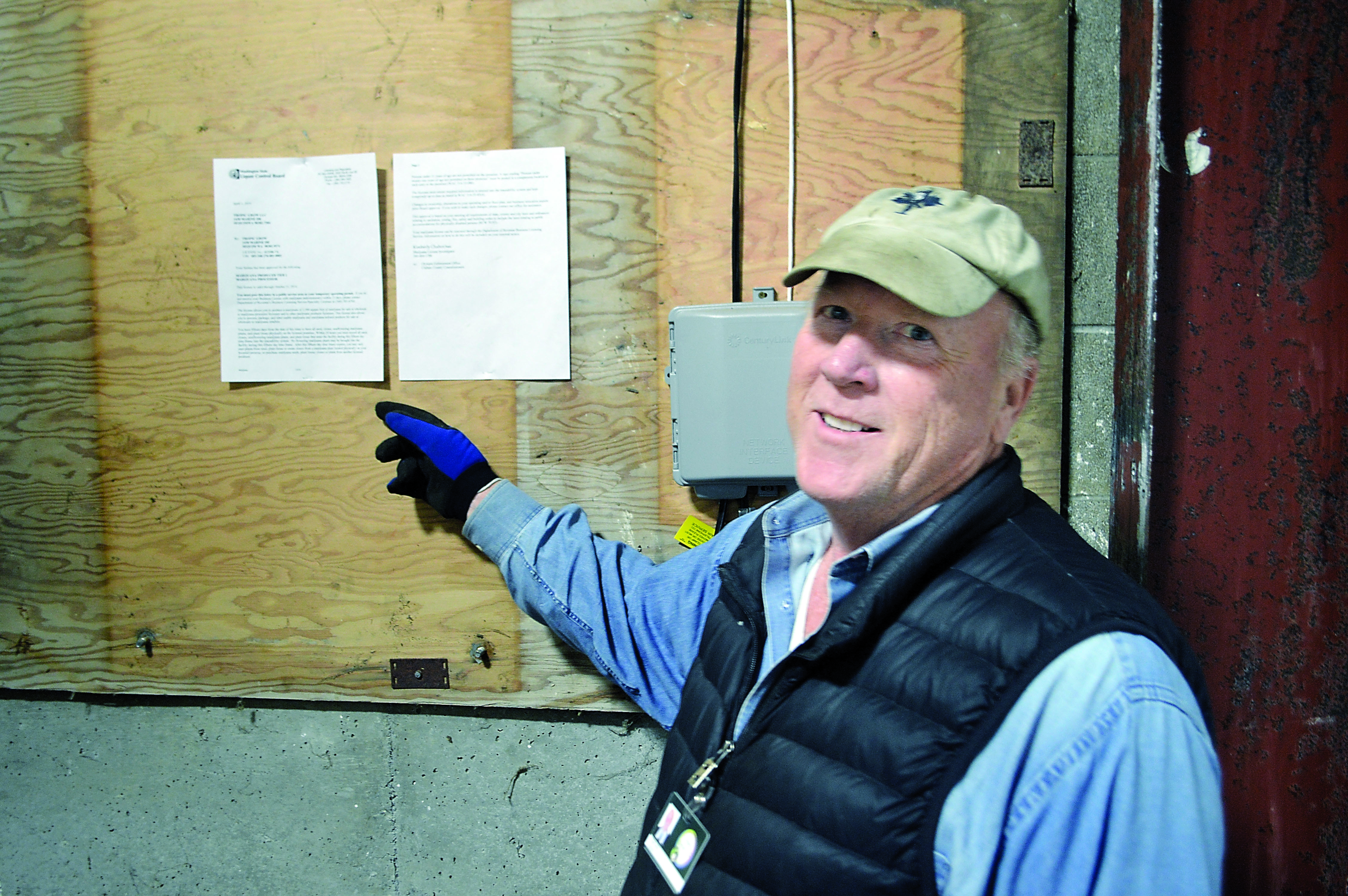SEQUIM –– A few thin green stalks are growing under lights in an old dairy barn at Dungeness, maturing slowly into the North Olympic Peninsula’s first legal crop of recreational marijuana.
From the outside, the barn at 1430 Marine Drive, next to a lavender farm and on a dairy once owned by the Dick family of Kitchen-Dick Road fame, looks similar to the many decommissioned dairy barns in the Dungeness Valley.
With its concrete floors, floor grates and high ceilings, the inside also still bears the building’s dairy heritage, but soon, the old milking parlor will have flowering marijuana plants.
“Eventually, this will be filled with green plants,” Thomas Ash said.
“It’s a rebirth of this building.”
Ash has been growing pot in the barn since receiving licenses to grow and produce marijuana from the state April 1.
His company, Tropic Grow LLC, is one of nine growers approved statewide, and the only one so far on the Peninsula, by the state Liquor Control Board since the legalization of recreational pot.
Tropic Grow’s license was announced by the liquor board Tuesday.
The Tier 2 producer license that hangs inside the barn allows the company to initially grow up to 7,000 square feet of canopy, about 3,000 plants.
This first crop, grown from seeds Ash ordered from Amsterdam, should be mature in time for the expected opening of retail marijuana stores in July.
“They gave us 15 days to get our seed stock from wherever we could,” he said. “After that, we could only get it from state-sanctioned suppliers — which don’t exist yet.”
New crops will be ready every month, with production escalating until he reaches capacity, which Ash expects to hit about the end of this year.
Ash is growing four strains of marijuana that he hopes will be enough to supply the demand of retail stores that might open on the Peninsula.
A separate room in the barn is designated for picking buds from the plants and bagging them for retailers to sell.
There is no limit on the number of growers or processors that will be licensed, though statewide production has been capped.
The state will hold lotteries late this month to award licenses for retail marijuana stores.
Ten stores will be allowed on the Peninsula, with sales expected to begin in July.
Ash, a retired health care executive who moved to Sequim from California in 2003, said he got into the marijuana business because he saw a lucrative way to spend his retirement.
“We’re not users. We’re not advocates. This isn’t a philosophical or ethical thing for us,” Ash said of the venture he’s taken with wife Jean Davis.
“We’re businesspeople with business backgrounds who saw a business opportunity.”
Because the couple owned the land and the building and plan to staff the operations themselves, Ash said start-up costs were minimal.
“It’s a lot easier than if I was going to try to set up a McDonald’s franchise,” he said. “I had most of the stuff I needed right here.”
On the same property, the couple’s Tropic Grow has been growing tropical plants such as mangos, papayas, wasabi and vanilla for several years.
“To is, this is just another crop,” he said.
This crop, however, requires higher-security measures mandated by the liquor board and inspected thoroughly as part of the months-long application process.
Ash has 20 motion-activated infrared cameras constantly monitoring inside and outside the building. Regulations require he keep 45 days of surveillance footage available for state review at all times.
He also can’t market the crop as organic, as federal laws against marijuana prohibit the U.S. Department of Agriculture from certifying it organic.
Last fall, Ash got permits from Clallam County to build three greenhouses, one on the Marine Drive property and two on Shore Road in case, he said, the state rejected his barn as a grow site.
He will not build those greenhouses now that his barn has been approved.
Neighbors of the proposed sites were notified by the county’s Department of Community Development, with a few — primarily neighbors of the Shore Road location — expressing concerns that marijuana grow operations could attract criminals trying to poach plants.
Ash said his security plan was the largest factor in the state’s review of his application. In addition to the surveillance system, every plant must be catalogued from seed to plant to harvest.
Because of that, he said, many of the security concerns were overstated.
“Cigarette trucks are robbed all the time,” he said. “But nobody goes to a tobacco farm to steal tobacco.”
Neighbors he has talked with have been mostly ambivalent to his new venture, he said.
“I think this is only going to enhance the neighborhood because we’re fixing up this old building,” he said.
Three other prospective Peninsula growers — Panesc, 115 Rocky Road in Port Angeles; Don Dills, 152 Breezy Lane in Port Angeles; and Oats Planter Farm, 6131 Cape George Road in Port Townsend — had their applications listed as “closed” on the liquor board’s list of applicants that was released Tuesday.
Brian Smith, spokesman for the Liquor Control Board, said the closed status means the applications were either rejected by the liquor board or withdrawn by the applicants but did not say for what reason those three were closed.
Clallam County still has 48 producer, 28 processor and 33 retail applicants pending state approval. Jefferson County has 25 producer, 27 processor and 17 retail applications pending.
________
Sequim-Dungeness Valley Editor Joe Smillie can be reached at 360-681-2390, ext. 5052, or at jsmillie@peninsuladailynews.com.
